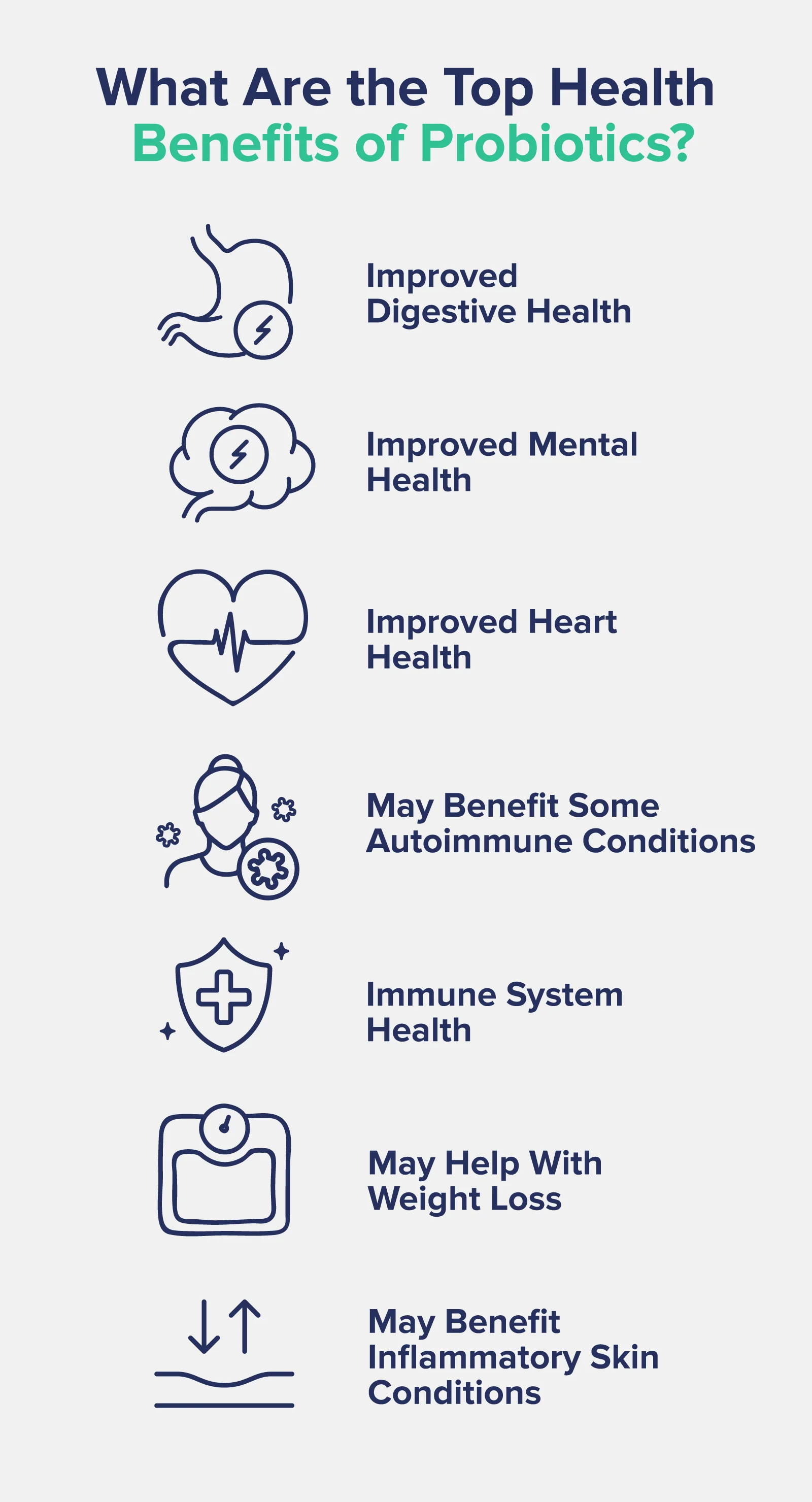Try our favorite, clean protein powder: See our top pick →
Try our favorite, clean protein powder: See our top pick →
This post contains links through which we may earn a small commission should you make a purchase from a brand. This in no way affects our ability to objectively critique the products and brands we review.
Evidence Based Research To fulfill our commitment to bringing our audience accurate and insightful content, our expert writers and medical reviewers rely on carefully curated research.
Read Our Editorial Policy
Probiotics do more than simply benefit the gut—they are also thought to be involved with just about every system in the body.
From weight loss and depression to autoimmunity and heart health, recent research has increasingly shown the potential benefits of supplemental probiotics and maintaining a healthy gut microbiome.

Unsurprisingly, probiotic supplements have been most studied for their digestive health benefits.
One key reason behind this is probiotics’ role in managing dysbiosis. When our gut microbiota populations become out of whack, dysbiosis—an imbalance of good and bad bacteria—can develop.
Dysbiosis is a common cause of health problems—both digestive and non-digestive—so repopulating your gut microbiome with friendly bacteria can help to correct this imbalance.
Probiotics are also thought to improve several digestive-related conditions or symptoms, including:
However, the research is mixed when it comes to Crohn’s disease, and probiotics may only promote digestive health in people with ulcerative colitis.
Although the gut-brain axis is a recently coined term, people have known that digestion and emotions are linked for hundreds of years.
Probiotic bacteria thought to benefit neurological or psychological symptoms are referred to as “psychobiotics,” as they act on neurotransmitters and other areas of the central nervous system.
Scientific evidence shows that probiotic supplements may benefit mental health disorders.
One meta-analysis of 34 clinical trials concluded that taking probiotics led to small but significant effects in reducing symptoms of depression and anxiety.
Most people have heard of the gut-brain axis now—but the gut-heart axis is an even newer area of research.
The gut-heart axis involves how the bacteria and metabolites in our digestive tracts influence our cardiovascular system.
The microbiomes of people with heart disease or other cardiovascular conditions have been found to be different than those of healthy people, including alterations in gut bacteria species and metabolites called short-chain fatty acids (SCFAs).
Gut dysbiosis is associated with negative changes in lipid or cholesterol profiles that increase the risk of heart disease, including higher LDL cholesterol, lower HDL cholesterol, and higher blood pressure.
This may be mediated by SCFA activity, as these fatty acids (butyrate, acetate, and propionate) influence blood pressure, blood sugar control, and lipid metabolism. SCFAs have been shown to lower cholesterol synthesis rates, leading to lower blood cholesterol levels.
In one small study of people with coronary artery disease, those who took the probiotic Lactobacillus rhamnosus GG and ate a calorically restricted diet had significant improvements in inflammation and cardiovascular-related biomarkers, including fasting blood sugar, compared to those who were just on the diet. Similarly, a meta-analysis of 26 trials concluded that probiotic supplements significantly improved cardiovascular risk factors, including waist circumference, insulin levels, total cholesterol, and LDL cholesterol, compared to control groups.
Some research has suggested that symptoms of autoimmune diseases like rheumatoid arthritis, inflammatory bowel disease, multiple sclerosis (MS), and lupus may benefit from supplemental probiotics.
However, as there are more than 100 types of autoimmune diseases, probiotics are not known to benefit all of them.
More research is needed before probiotic use is recommended in people with autoimmune diseases.
Plus, some probiotic strains might be contraindicated in immunocompromised people, which is a state that can arise from certain immunosuppressing medications for autoimmune disease.
If you’re unsure, talk to your doctor before starting a probiotic supplement.
Probiotics can interact with several types of immune cells, influencing their activity and affecting immune function.
Studies have shown that probiotics can modulate innate and adaptive immunity in older adults and reduce the length of infection in children and adults.
Research has also uncovered that taking probiotics can improve immune responses to influenza vaccinations, increasing protection from the flu. For example, one meta-analysis found that people taking probiotics before getting the H1N1 influenza B vaccine had 53% protection rates against that virus compared to 37% in the group not taking probiotics.
Several studies suggest that certain probiotics can help with weight loss or fat loss.
This is likely because some gut bacteria are associated with obesity, and others are linked to “leanness.” Therefore, balancing your gut microbiome to have more lean-promoting bacteria may help with weight loss.
A meta-analysis of 23 clinical trials found that probiotics effectively reduced BMI (Body Mass Index), body weight, visceral abdominal fat, waist circumference, and hip circumference in 14 of the studies. Another review examined the types of bacteria that were beneficial for weight loss, finding that the most effective probiotic strains belonged to the genera Lactobacillus, Bifidobacterium, and Pediococcus, with doses of at least 1 million CFUs for a minimum of four weeks.
Skin conditions related to inflammation—like psoriasis, rosacea, eczema/atopic dermatitis, and acne—may be improved by probiotic supplements.
One small clinical trial found that people with psoriasis who received spore-forming oral probiotics and a topical cream for psoriasis had better results than those who just used the cream.
In this study, the probiotic group had improved scores on psoriasis tests (including Psoriasis Area and Severity Index and Dermatology Life Quality Index) and reductions in inflammatory markers and skin thickness (a positive marker for psoriasis patients).
However, the research is far from conclusive, and people have varying results from taking probiotics.
Topical probiotic products have also been researched in people with inflammatory skin conditions. Still, oral probiotic supplements may work better because they act on the gut-skin axis—not just the skin. Although the species and genera of probiotics used in skin studies vary, this image (from a review paper published in the journal Nutrients) depicts certain bacteria strains that may benefit various skin conditions.
Although “probiotics” is a wellness buzzword, and you’ve probably heard it hundreds of times, you may wonder what exactly probiotics are.
Probiotics are live microorganisms (either from fermented foods or supplements) that can alter the composition of the microbiota (typically in the gut) and are thought to provide health benefits to the host (us!).
However, probiotics are not just used to benefit the gut microbiome—we also have microbiomes all over our bodies, including the collection of bacteria on our skin and in our mouth, vagina, eyes, ears, and more.
Probiotics have a unique language, identified by their genus, species, subspecies, and alpha-numeric strain.
The most common genera in probiotic supplements are lactic acid bacteria (like Lactobacillus, Bifidobacterium, Saccharomyces, Enterococcus, and Bacillus). For example, a commonly used probiotic is Bifidobacterium (genera) animalis (species) lactis (subspecies) DN-173 010 (strain).
If you don’t want to eat your probiotics via fermented foods, some of the best probiotic supplements can be found in these articles: Best Probiotics for Men and Best Probiotics for Women.
Briefly, here are a few of our top favorites for women:

For men looking for a probiotic, try one of these:

Although most probiotic supplementation can benefit all types of adults, women can benefit from certain strains of bacteria that target female-specific health concerns.
In addition to supporting the digestive system, mental health, heart health, and more, probiotics for women can regulate vaginal pH and balance the vaginal and urinary microbiomes. This helps to protect against infections like bacterial vaginosis, urinary tract infections, and yeast infections.
Fermented foods are all high in probiotics, including:
• Sauerkraut
• Kimchi
• Fermented dairy products (like kefir, yogurt, buttermilk, and sour cream)
• “Real” pickles (refrigerated ones)
• Fermented vegetables
• Kombucha
• Tempeh
• “Real” sourdough (does not contain yeast or preservatives)
• Miso
• Natto
If you take a high-quality probiotic supplement every day, you might experience beneficial effects on your digestive system. Some other potential benefits of probiotics include improved immune system function, skin health, mental health, and heart health. However, the results can vary widely depending on the certain probiotic strains you take and what your overall health status is.
There are many potential health benefits of probiotics when used as a dietary supplement, as these healthy bacteria can repopulate the gut and reduce dysbiosis—a buildup of “bad” bacteria without enough good bacteria.
Although it can vary individually, research has shown that probiotic microorganisms may benefit digestive and gut health, including disorders like irritable bowel syndrome (IBS), inflammatory bowel disease (IBD, which includes ulcerative colitis and Crohn’s disease), SIBO (small intestinal bacterial overgrowth), constipation, and diarrhea.
Probiotics may also have health benefits for symptoms or conditions not related to the digestive system, including inflammatory skin conditions (acne, eczema/atopic dermatitis, and psoriasis), respiratory infections, allergies, obesity, urinary tract infections, and depression or mental health disorders.
Many areas of the body can benefit from probiotics, as we have microbiomes in more regions than just the gut. Some other notable collections of bacteria in our bodies include the microbiomes of the mouth, vagina, eyes, and ears.
In addition to these microbiomes, the health of our gut microbiome can also act on other areas of the body, including the cardiovascular system (the gut-heart axis), the immune system (gut-immune crosstalk), the brain (gut-brain axis), and more.
Truth be told, there really isn’t a region or system in the body that is not potentially affected by probiotics. However, there is insufficient evidence thus far for all health conditions.
Some people might experience digestive discomfort, gas, or bloating when taking probiotic supplements, especially if it has many strains or a high CFU (colony-forming units) count. However, the potential gut health benefits over time typically outweigh the possible discomfort initially.
As mentioned in the autoimmune disease section, people who are immunocompromised or take immunosuppressive medications may want to take caution with probiotics and should speak with their doctor first.
Although probiotic microorganisms are beneficial bacteria, immunocompromised people may not be able to mount an appropriate response to any microbe they come in contact with, leading to infections.
Subscribe now and never miss anything about the topics important to you and your health.